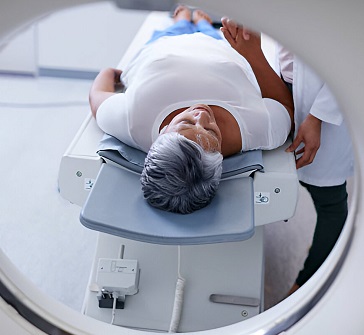 Book Appt.
Book Appt.
 Call Now
Call Now


The term bone cancer refers to a variety of malignancies that grow in your bones. When cancer cells proliferate in bone, they might damage normal bone tissue. Bone cancer can develop in any bone, but it most usually occurs in the thigh, shin, or upper arm. Primary bone cancers are also known as bone sarcomas. Many malignant tumors that start in organs or other sections of your body might spread to your bones and other body components. These growths are known as bony metastases. Breast, prostate, and lung cancers are the most likely to metastasis (spread to the bones).
There are three major forms of primary bone cancer. The type of bone cancer is determined by the type of cell and tissue in which cancer begins.
Symptoms
Some persons with bone cancer experience no symptoms other than a painless lump. For others, a range of symptoms may arise. Some symptoms, such as growing pains, sports injuries, arthritis, or Lyme disease, might be easily misdiagnosed by healthcare providers. Narrowing things down may cause a delay in the diagnosis. The most prevalent indications of bone cancer are:
Causes
Experts are not sure what causes bone cancer. Bone tumors, like other malignancies, develop when issues with cell DNA lead cells to grow out of control. They eventually form a mass that causes damage to the healthy tissue around them. Without treatment, bone cancer can spread to other regions of the body.
Diagnosis
To identify bone cancer, your healthcare professional will frequently utilize X-rays to examine your bones. Magnetic resonance imaging (MRI) and computed tomography (CT) scans produce more comprehensive images of the areas surrounding your bones. You'll probably need these before therapy.
To confirm the diagnosis, your doctor will perform a biopsy. They will take a little sample of tissue from your bone and analyze it under a microscope. A biopsy can reveal particular information about the cancer type. Having this information allows clinicians to determine which therapy will work best.
Bone cancer staging
Cancer staging allows healthcare workers to assess whether the cancer is just present in one location (localized) or has spread throughout your body (metastasized). They also examine how probable it is to spread, assuming it hasn't already. The tumor's grade, or how aberrant the cancer cells seem, indicates how likely it is that cancer will spread. There are two systems that clinicians might use to stage bone cancer. The Musculoskeletal Tumor Society, or Enneking system, utilizes the following staging guidelines:
Treatment
The most common treatment for bone cancer is surgery to remove the tumor. The most common type of surgery is limb-sparing surgery, which involves removing only the tumor and some healthy tissue around it while leaving your arm or leg intact. They can use natural or synthetic bone grafts to mend or reconstruct damaged bones. Your surgeon may need to remove a whole limb to treat cancer. In this situation, your healthcare professional will equip you with an artificial limb (prosthesis) following surgery. These advanced technologies allow people to continue with their daily tasks in much the same way they did before surgery.
Other treatments include:
Prevention
There is presently no known strategy to prevent bone cancer because researchers do not understand what causes it. And, because radiation therapy (another recognized cause of bone cancer) is required to treat other types of cancer, it cannot be avoided entirely. You can still consult a doctor if you notice any unexpected changes in your bones, such as a bump or growing bone pain. These symptoms do not usually indicate malignancy. However, only a provider can determine what's causing the issue.
Conclusion
Bone cancer, while uncommon, is a serious and life-threatening disorder that necessitates immediate diagnosis and treatment. Many bone cancer patients can now live longer, healthier lives thanks to advancements in medical technology, chemotherapy, surgery, and tailored therapies. However, early discovery is still critical to improve results, so if you have chronic bone pain, swelling, or fractures, get medical assistance. The path to recovery can be difficult, but with the correct therapy and care, people with bone cancer can expect a good outcome.
SHALBY Sanar International Hospitals provides extensive medical procedures backed up with our state-of-the-art technology and a team of highly qualified & experienced clinical experts.

Grade 2 Endometrium Cancer | Ms. Robiyakhon | Uzbekistan | Dr. Archit Pandit | SHALBY Sanar

Male Breast Cancer Recovery Story | Dr. Archit Pandit | Cameroon | SHALBY Sanar

Ms. Nafisa’s Inspiring Breast Cancer Recovery | Dr. Archit Pandit | Uzbekistan | SHALBY Sanar International Hospitals

Stage4 colon cancer is curable - Colon cancer with liver metastasis | Kenya | Dr Archit Pandit

Patient from Kenya Treated by Dr. Archit Pandit | SHALBY Sanar International Hospitals

Double Cancer Victory: Mrs. Salma Kapoor's Inspiring Recovery Story | Dr. Archit Pandit

Patient from Uzbekistan Treated by Dr. Archit Pandit | SHALBY Sanar International Hospitals

Patient from Uzbekistan Treated by Dr. Archit Pandit | SHALBY Sanar International Hospitals

Successful Carcinoma Buccal Mucosa Surgery of a Patient from Nigeria by Dr. Archit Pandit

Successful Colon Cancer Surgery of Mr. Faraidun Kaka Bra Amin Amin's from Iraq | Dr Archit Pandit

Miraculous Recovery of a patient from Uzbekistan battling Ovarian Cancer | Dr. Archit Pandit

Successful Cancer Detection & Surgery by Dr. Archit Pandit | SHALBY SHALBY Sanar International Hospitals

Successful Colon Cancer Treatment of a patient from Iraq by Dr Archit Pandit | Surgical Oncology

Successful Glottis Mass & Carcinoma Vocal Cord Treatment of a patient from Iraq by Dr Archit Pandit

Successful Stage 4 Colon Cancer Treatment of a patient from Kenya by Dr Archit Pandit

Surviving the Odds: 56-Year-Old's Journey with Recurrent Carcinoma Vocal Cord | Dr. Archit Pandit

Surviving Recto-Sigmoid Cancer: Mr. Syamand Ahmed's Inspiring Journey

Success Story: Iraqi Patient's Liver Tumour Treatment at SHALBY Sanar International Hospitals

Cytoreductive Surgery Success: Iraqi Patient's 30cm Ovarian Tumor Removed Safely

Beating Liver Cancer: Mr. Abdirashid's Inspiring Story

Ms. Nejood's Success Over Pancreatic Cancer: A Remarkable Journey

Transforming Smiles: Revolutionary Buccal Commando Procedure

Wide Local Excision Surgery & Microvascular Reconstruction of a Cancer patient

Successful Surgery of Esophgeal Cancer

Successful Lung Cancer Surgery of Ms. Jerioth Wanjiru from Kenya

Para Thyroidectomy on Pt Jawad Kadhim Tweli from Iraq

Dr Archit Pandit discusses the fascinating case of Geeta Rani
Our doctors pen down their research findings and experiences from time to time. Their words provide deep insight into the latest techniques, technologies and other advancements in healthcare. It provides expert answers to all kinds of health questions for real-life issues.
VIEW ALL




Since the day of its foundation, SHALBY Sanar International Hospitals is committed to provide comprehensive healthcare services. It regularly organizes awareness programs in its premises and encourages outdoor healthcare activities and camps with an intent to put focus on preventive healthcare.
VIEW ALL